Is Creatine Vegan?
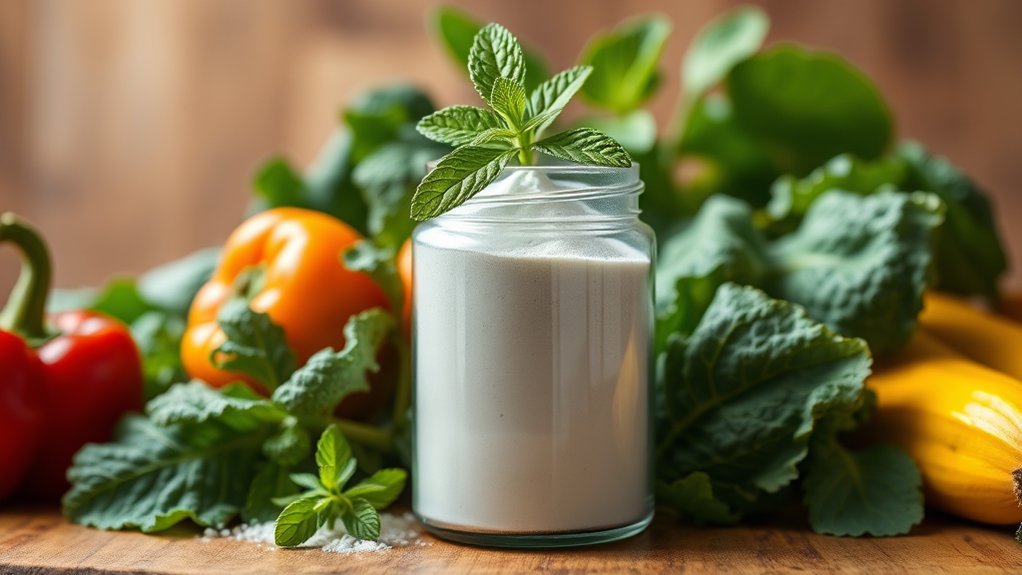
Are you curious about whether creatine fits into a vegan lifestyle? It’s a question many plant-based athletes and fitness enthusiasts ponder. With the rising popularity of vegan diets, understanding the sources of supplements like creatine is essential. Knowing what goes into your body can make a significant difference in your health and performance. While many people associate creatine with animal products, there’s more to the story. Let’s dive into the details and uncover what you need to know about creatine and its compatibility with a vegan diet.
What Is Creatine?
Creatine is a compound that your body naturally produces from amino acids such as arginine, glycine, and methionine, with the majority being stored in skeletal muscle. It plays a crucial role in energy production by helping regenerate adenosine triphosphate (ATP), which is the primary energy source during high-intensity activities.
On average, your body synthesizes about 1 gram of creatine each day. However, dietary sources predominantly come from animal products, which can result in lower creatine levels for those following a plant-based diet.
For vegetarians and vegans, creatine supplementation, particularly in the form of creatine monohydrate, can significantly boost exercise performance and support muscle growth due to their typically lower baseline creatine levels.
Many creatine supplements are formulated to be vegan-friendly, but it’s always a good idea to check for any non-vegan ingredients in the capsules or other forms you might consider.
Understanding creatine and its benefits can help you make informed choices about your nutrition and training regimen.
How Is Creatine Synthesized?
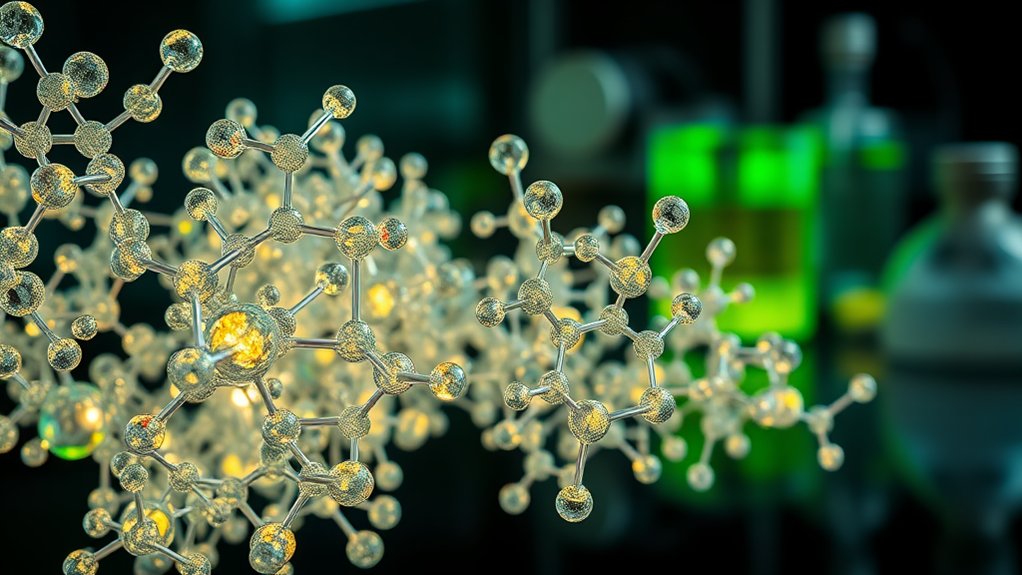
Creatine is produced in the body from amino acids such as arginine, glycine, and methionine, predominantly in the liver and kidneys.
For those looking for vegan creatine supplements, the production often involves using sodium sarcosine and cyanamide, which are sourced from non-animal materials.
The process includes heating these components and purifying the end product to confirm it aligns with vegan standards.
Now, let’s check out how creatine works in the body and its benefits for various types of physical activities.
Vegan Creatine Ingredients
When looking into vegan creatine, it’s important to know how it’s produced from non-animal sources. Vegan creatine is typically synthesized using sodium sarcosine and cyanamide, both of which don’t come from animal products.
Sarcosine is derived from glycine, an amino acid that’s naturally found in various plant-based foods. On the other hand, cyanamide is made up of carbon, nitrogen, and hydrogen. This synthetic method make certains that creatine supplements are suitable for those following a vegan lifestyle.
When selecting vegan creatine products, it’s advisable to look for those that explicitly avoid animal-derived ingredients, including in their capsules. Many brands opt for plant-based alternatives like pectin to make sure their products remain vegan-friendly.
To make an informed choice, check for the Certified Vegan logo on the packaging, which indicates that no animal products have been included.
Production Process Overview
To understand the synthesis of vegan creatine, it’s important to look at the key components involved in its production. Vegan creatine is created through a chemical reaction between sodium sarcosine and cyanamide. Sarcosine, which is derived from glycine (an amino acid found in many plant-based foods), plays a crucial role in this process.
On the other hand, cyanamide is made up of carbon, nitrogen, and hydrogen, and importantly, it’s also free from animal products, making it suitable for both vegetarian and vegan formulations.
The actual production of vegan creatine takes place in a reactor where these compounds are heated. This heating initiates the necessary chemical reactions to form creatine.
Once the synthesis is complete, the resulting mixture undergoes purification through centrifugation. This step is essential for isolating creatine monohydrate, the most common form of creatine used in supplements.
After purification, the creatine is then dried and milled into a fine powder, resulting in a vegan-friendly supplement that contains no animal-derived ingredients.
This process not only make certains the quality and efficacy of the creatine but also aligns with the values of those seeking plant-based options for their dietary supplements. By understanding this synthesis process, consumers can make informed choices about incorporating vegan creatine into their fitness and wellness routines.
Is Creatine Monohydrate Vegan?
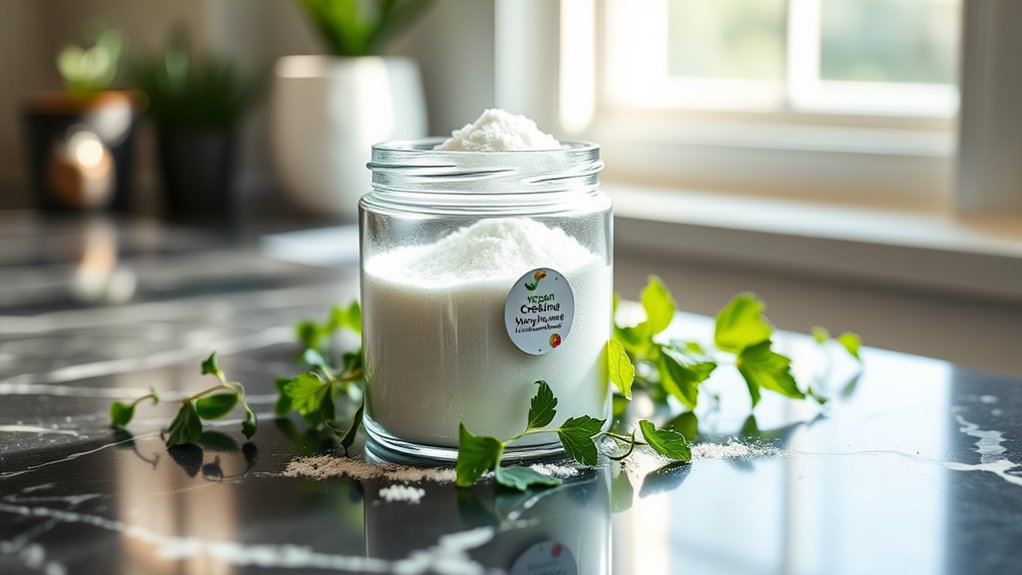
Creatine monohydrate is often a topic of interest for those following a vegan lifestyle. The good news is that creatine monohydrate is generally considered vegan-friendly. It’s synthesized from non-animal sources, primarily sodium sarcosine and cyanamide. This means that pure creatine monohydrate powders don’t contain any animal-derived ingredients, which is an important consideration for those on a plant-based diet.
However, it’s worth noting that some creatine supplements may come in capsule form that contains bovine gelatin. To assure you’re choosing a vegan option, look for products that have the Certified Vegan logo. This certification indicates that no animal products were used in the manufacturing process.
Creatine monohydrate provides the same performance-improving benefits for vegans as it does for non-vegans, such as improved muscle strength and boostd exercise performance. This makes it a valuable addition to the supplement regimen of anyone looking to boost their workouts, regardless of their dietary preferences.
Comparison of Creatine Forms
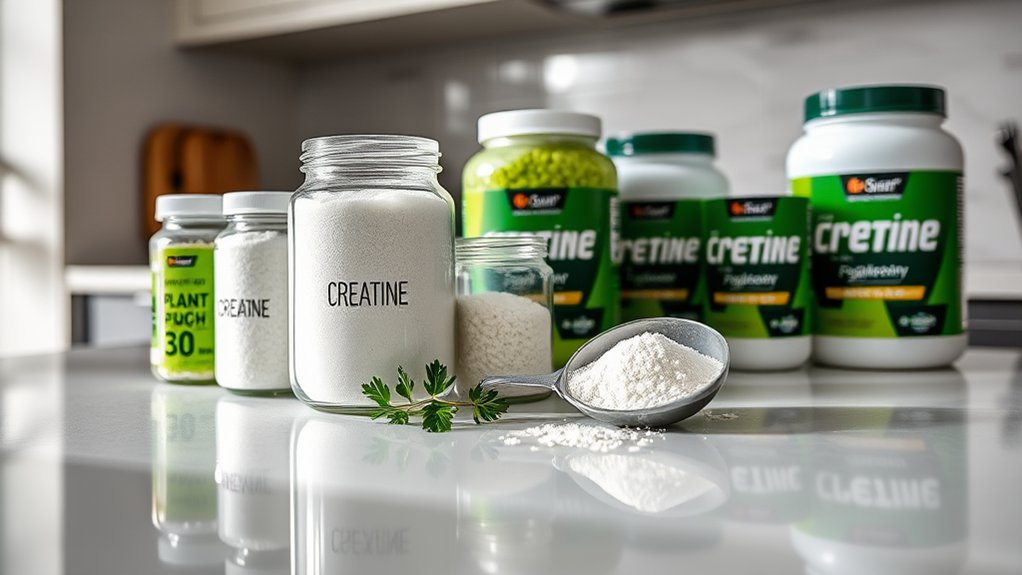
When looking at different forms of creatine, it’s useful to know the distinctions between synthetic and natural sources.
Creatine monohydrate is the most studied option, but there are alternatives like creatine ethyl ester and buffered creatine that come with their own benefits.
By considering the source and formulation of these supplements, you can find a vegan-friendly choice that suits your needs.
Speaking of which, let’s dive a bit deeper into the various benefits these alternatives might offer.
Synthetic vs. Natural Creatine
Understanding the differences between synthetic and natural creatine is crucial for making informed choices about supplementation, particularly for those adhering to a vegan diet.
Synthetic creatine is manufactured using ingredients like sodium sarcosine and cyanamide, making it a suitable option for vegans since it doesn’t contain any animal-derived components. On the other hand, natural creatine is primarily sourced from animal products such as meat, fish, and eggs. For individuals who consume these foods, the average dietary intake of creatine is around 2 grams per day.
Vegans and vegetarians often have lower baseline creatine levels, which can impact their exercise performance. To address this, creatine monohydrate supplementation is recommended, as it helps to grow muscle creatine stores effectively.
Both synthetic and natural forms of creatine have been shown to improve exercise performance, but synthetic creatine is particularly advantageous for those who want to avoid animal products. This allows individuals to pursue their fitness goals while staying true to their dietary preferences.
Creatine Types and Sources
Creatine is a popular supplement that comes in various forms, each offering distinct characteristics and potential benefits for those looking to boost their athletic performance and muscle growth. The most widely studied and commonly used type is creatine monohydrate, which has a strong research foundation supporting its effectiveness.
For those following a vegan lifestyle, it’s important to seek creatine supplements that are free from animal-derived ingredients. Many vegan-friendly creatine options use synthetic sources, such as sodium sarcosine and cyanamide, assuring they align with dietary preferences without compromising on efficacy.
While alternatives like creatine ethyl ester and buffered creatine are available, they may not have the same level of research backing as creatine monohydrate. This is a crucial consideration when selecting a supplement, as the evidence supporting its benefits can significantly influence your results.
Creatine is available in multiple formats, including powders, capsules, and gummies, catering to different preferences for consumption. When selecting a creatine supplement, it’s advisable to check for certifications like “Certified Vegan” to assure that the product meets your dietary needs.
Are Creatine Supplements Animal-Derived?

Creatine supplements are often a topic of concern for those following a vegan lifestyle, as many people wonder if they contain animal-derived ingredients. The good news is that most creatine supplements are synthesized from non-animal sources, such as sodium sarcosine and cyanamide. This makes them suitable for vegans and those looking to avoid animal products.
When it comes to creatine monohydrate, the most commonly used form of creatine, you’ll find that many products on the market are indeed vegan-friendly. However, it’s still essential to read labels carefully to check for any hidden animal-derived ingredients.
For example, some creatine capsules may contain bovine gelatin, which isn’t suitable for vegans. To avoid this, consider opting for powder or tablet forms that use plant-based ingredients like pectin instead.
If you’re looking for assurance, look for the Certified Vegan logo on the packaging. This certification indicates that the product has been verified to meet vegan standards, providing an extra layer of trust.
Vegan-Friendly Creatine Brands
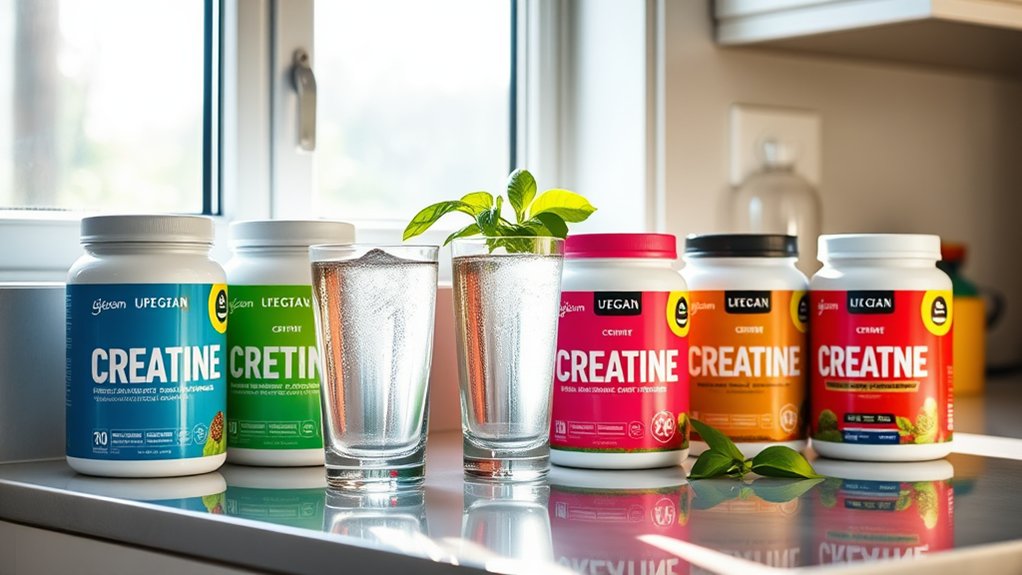
When looking for vegan-friendly creatine brands, it’s important to choose options that are free from animal-derived ingredients. Creatine supplements, particularly creatine monohydrate, are often synthesized from ingredients like sodium sarcosine and cyanamide, making them suitable for vegans.
Some reputable vegan creatine brands to consider include Optimum Nutrition, Bulk Powders, and Klean Athlete. These brands offer products that don’t contain any animal-derived components. You’ll find creatine in various forms, such as powders and capsules. For those opting for capsules, many brands use plant-based ingredients like pectin instead of gelatin, which is commonly derived from animals.
To confirm that you’re selecting a truly vegan product, look for the Certified Vegan logo on the packaging. This certification guarantees that the supplement contains no animal products. Naked Nutrition and Muscle Feast are two brands that prioritize transparency in their sourcing, allowing you to make informed decisions about your vegan creatine supplements.
Health Benefits of Creatine for Vegans

Creatine supplementation can offer significant advantages for vegans aiming to boost their athletic performance. Typically, plant-based diets lead to lower baseline levels of creatine in the body, which can impact muscle mass and strength. By taking creatine, vegans can help bridge this gap, especially those who may have lower creatine levels compared to individuals following omnivorous diets.
For vegans engaged in high-intensity workouts, creatine plays a crucial role in supporting rapid energy production during anaerobic exercises. This can lead to improved performance, allowing for better workout outcomes and progress over time.
Also, research suggests that creatine may also boost cognitive function and memory. This dual benefit can be particularly appealing for those looking to improve both mental acuity and physical performance.
Incorporating creatine into your diet can help you achieve performance levels similar to those who consume animal-based products. This makes creatine a practical and effective option for optimizing your athletic results while adhering to a vegan lifestyle.
If you’re considering adding creatine to your regimen, it’s worth consulting with a healthcare professional or a nutritionist to tailor the approach to your specific needs and goals.
Recommended Dosage for Vegans
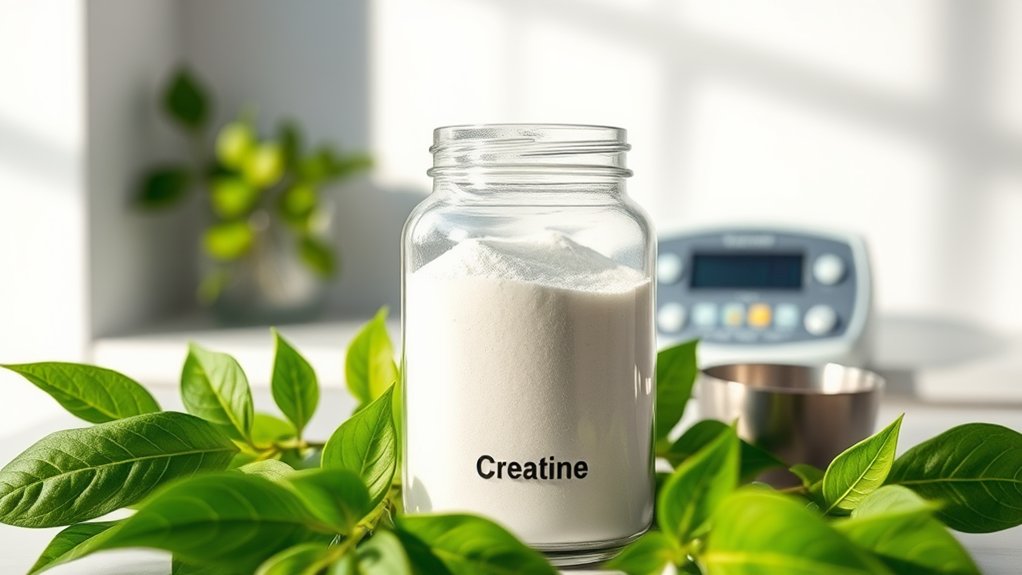
Supplementing with creatine can be particularly beneficial for vegans, as they often have lower baseline levels of this important compound. The recommended dosage for vegans typically ranges from 3 to 5 grams of creatine per day. This amount is effective in boosting muscle creatine levels and increasing overall performance.
For those new to creatine supplementation, a loading phase may be advantageous. During this phase, taking around 20 grams per day for the first 5 to 7 days can help saturate the muscles more quickly. After this initial period, a maintenance dose of 3 to 5 grams daily is generally sufficient to maintain furtherd creatine levels.
Research indicates that vegans may experience a more pronounced response to creatine monohydrate supplementation, due to their lower initial levels. To optimize absorption, it’s often recommended to take creatine post-workout, ideally alongside carbohydrates or protein. This can boost its uptake into the muscles.
As with any supplement, it’s important to consult with a healthcare professional to tailor the dosage to your unique dietary habits and activity level. This personalized approach make sures you can reap the full benefits of creatine supplementation while aligning it with your lifestyle.





